 Petzlover
Petzlover Bernese Mountain Dog is originated from Switzerland but Boykin Spaniel is originated from United States. Bernese Mountain Dog may grow 25 cm / 10 inches higher than Boykin Spaniel. Bernese Mountain Dog may weigh 37 kg / 82 pounds more than Boykin Spaniel. Bernese Mountain Dog may live 8 years less than Boykin Spaniel. Bernese Mountain Dog may have more litter size than Boykin Spaniel. Both Bernese Mountain Dog and Boykin Spaniel requires Moderate Maintenance.
Bernese Mountain Dog is originated from Switzerland but Boykin Spaniel is originated from United States. Bernese Mountain Dog may grow 25 cm / 10 inches higher than Boykin Spaniel. Bernese Mountain Dog may weigh 37 kg / 82 pounds more than Boykin Spaniel. Bernese Mountain Dog may live 8 years less than Boykin Spaniel. Bernese Mountain Dog may have more litter size than Boykin Spaniel. Both Bernese Mountain Dog and Boykin Spaniel requires Moderate Maintenance.
 The Bernese Mountain Dog comes from the Swiss Alps and is one of four separate breeds called Sennenhund or “Alpine pasture dog”. The Name Bernese Mountain Dog indicates the area of Switzerland that the dogs come from – the canton of Bern. These groups of dogs accompanied the dairymen and herders and they were farm dogs. They pulled carts, delivered goods from village to village. The Bernese Mountain Dog was part of this group along with: Greater Swiss Mountain Dog, Appenzeller,Entlebucher Mountain Dog and the Bernese Mountain Dog. It is probably true that the Bernese Mountain Dog has been a part of farm life in the Alps for over 2000 years.
The Bernese Mountain Dog comes from the Swiss Alps and is one of four separate breeds called Sennenhund or “Alpine pasture dog”. The Name Bernese Mountain Dog indicates the area of Switzerland that the dogs come from – the canton of Bern. These groups of dogs accompanied the dairymen and herders and they were farm dogs. They pulled carts, delivered goods from village to village. The Bernese Mountain Dog was part of this group along with: Greater Swiss Mountain Dog, Appenzeller,Entlebucher Mountain Dog and the Bernese Mountain Dog. It is probably true that the Bernese Mountain Dog has been a part of farm life in the Alps for over 2000 years.
In some regions of the Alps, these dogs were called Durrbachhund after a small town named Durrbah and are said to be rooted in the Molosser breeds. Tin 1902 the Swiss Kennel Club recognized the Bernese Mountain Dog as a separate breed and the first breed club was founded in 1907 in the region of Burgdorf. The first standard for the breed was written and separated the 4 dogs into their own breeds. The Molosser is an ancient breed whose versatility and travels made it expressly influential in the developing of Mastiff dogs like St. Bernards, Great Pyranees, Mastiffs and Swiss Mountain Dogs like the Bernese.
However at the end of the 19th century famers and shepherds began to import other breeds of working dogs, while at the same time automated modes of transportation began to replace the farm dogs. Under these circumstances the number of Bernese Mountain Dog began to decline and the breed faced potential extinction. A group of people were gathered together to save the Berner, including Franz Schertenleib and Albert Heim. Still today the Bernese are in short supply and because of the need and desire to increase the numbers, some breeding practices have not been as good as they should have been. However, today’s Berner is a great family dog and he still loves to work. He is good at carting, herding, search and rescue, watch dog, tracking, and competitive obedience.
The Bernese Mountain Dog came to the US after World War I and was imported to Britain in the 1930’s. The AKC accepted the Berner as a new Working-Class breed in 1937. It was not until 1968 that the Bernese Mountain Dog Club of America was formed. In 1981, the AKC accepted the club as a member and in 1990 they (AKC) adopted the standard used today to judge the Bernese Mountain Dog.
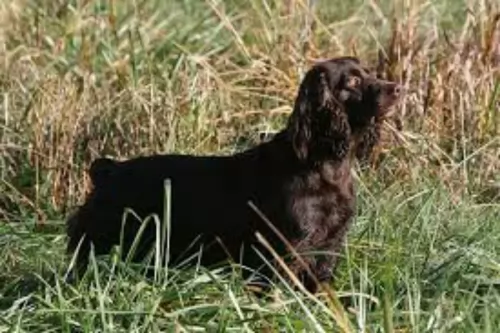 The Boykin Spaniel was originally bred by South Carolina hunters as the perfect dog for hunting wild bird during the early 1900s. Alexander White of Spartanburg found a short, well built dog and named him Dumpy. The dog was given to a certain L. Whitaker Boykin and a similar dog in looks was found and mated with Dumpy on Boykin’s Pine Grove plantation. Whitaker Boykin was particularly looking for a special kind of hunting dog breed that could wade into swamplands and into water.
The Boykin Spaniel was originally bred by South Carolina hunters as the perfect dog for hunting wild bird during the early 1900s. Alexander White of Spartanburg found a short, well built dog and named him Dumpy. The dog was given to a certain L. Whitaker Boykin and a similar dog in looks was found and mated with Dumpy on Boykin’s Pine Grove plantation. Whitaker Boykin was particularly looking for a special kind of hunting dog breed that could wade into swamplands and into water.
Boykin’s spaniels were popular in South Carolina before World War II and later, in 1977, the Boykin Spaniel Society was founded to ensure the breeding standards of the dog. In 1985, the Boykin Spaniel was declared the state dog of South Carolina and recognized by the American Kennel Club in 2009.
 The Bernese Mountain Dog is a large, lovable clown. He has a heavy build with a tri color- mostly black – coat. He should have a white chest and rust coloring on the front of his legs, the sides of his mouth, and above his eyes. His eyes should be dark and blue eyes are a disqualification. His coat is silky, thick and long. He has medium sized triangle shaped ears and a scissors bite. He has round toes and strong, straight legs, He is well suited to cold weather. His skull is broad and flat, his muzzle is straight and strong, his nose must be black, and he does not usually drool.
The Bernese Mountain Dog is a large, lovable clown. He has a heavy build with a tri color- mostly black – coat. He should have a white chest and rust coloring on the front of his legs, the sides of his mouth, and above his eyes. His eyes should be dark and blue eyes are a disqualification. His coat is silky, thick and long. He has medium sized triangle shaped ears and a scissors bite. He has round toes and strong, straight legs, He is well suited to cold weather. His skull is broad and flat, his muzzle is straight and strong, his nose must be black, and he does not usually drool.
He is an imposing sight, but he is also as non-aggressive as any breed. He is strong, intelligent, and agile. He should have his dew claws removed. This breed should be self-assured, yet good natured and calm. He is welcoming to strangers and loyal to his people. He needs his people.
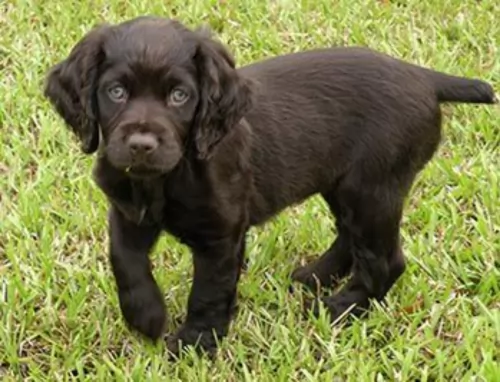 You can’t miss the medium-sized Boykin Spaniel with his magnificent coat in different shades of brown. When he gleams in the sun he looks like chocolate. This type of Spaniel is a bit bigger than the English Cocker Spaniel, but he is heavier, weighing between 13 to 18kg. He has large, floppy feathery ears and the tail has always been docked to give him that distinct look, but now with rules and regulations, the tail is often left so that it is long and feathery. The height of this dog at the withers is 39 to 43cm.
You can’t miss the medium-sized Boykin Spaniel with his magnificent coat in different shades of brown. When he gleams in the sun he looks like chocolate. This type of Spaniel is a bit bigger than the English Cocker Spaniel, but he is heavier, weighing between 13 to 18kg. He has large, floppy feathery ears and the tail has always been docked to give him that distinct look, but now with rules and regulations, the tail is often left so that it is long and feathery. The height of this dog at the withers is 39 to 43cm.
The length of the dog’s coat varies somewhat because of the different breeds from the past. Essentially the coat is medium length and wavy to curly with light feathering around the legs, ears, chest and stomach.
The Boykin Spaniel is social and he makes an excellent family pet. He is good around children and other dogs, and with training and socialization he becomes even more amicable and obedient.
 When reading the AKC standard for the Bernese Mountain Dog you will find that the breed is good natured and self-assured. They are not aggressive, shy or anxious. These are gentle, loving dogs. At the same time, they should be socialized to all kinds of animals, people and children when they are puppies. They are happy outside but need to live in the house with their people. They need exercise and play, and because they are so large, they need this outside. But when it comes to cuddling and sleeping they need to be indoors.
When reading the AKC standard for the Bernese Mountain Dog you will find that the breed is good natured and self-assured. They are not aggressive, shy or anxious. These are gentle, loving dogs. At the same time, they should be socialized to all kinds of animals, people and children when they are puppies. They are happy outside but need to live in the house with their people. They need exercise and play, and because they are so large, they need this outside. But when it comes to cuddling and sleeping they need to be indoors.
They love children though you should be careful with small children because of the Berner’s size and their not being aware of their size at times. They are extremely loyal to their people and want to be with people. They are intelligent, and they want to please their people. At the same time, they are sensitive. They do not respond well to punishment or harshness. They are imposing but they are lovers at heart.
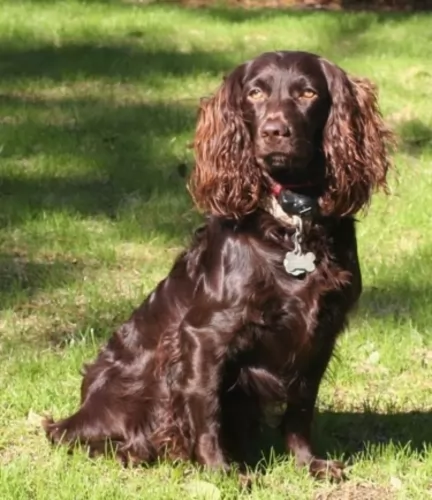 The Boykin Spaniel is a diverse breed. The characteristics of the dog aren’t set in stone. He is a hunting dogs with boundless energy and enthusiasm. He is an intelligent breed and responds well to training and is obedient to your commands. He is all about fun and excitement and he is guaranteed to make a splendid companion.
The Boykin Spaniel is a diverse breed. The characteristics of the dog aren’t set in stone. He is a hunting dogs with boundless energy and enthusiasm. He is an intelligent breed and responds well to training and is obedient to your commands. He is all about fun and excitement and he is guaranteed to make a splendid companion.
Active and social, he is going to need input from his owners in terms of exercise and mental stimulation. He isn’t a dog to just ignore and in exchange for love and care, he is going to be a loving, loyal and fun companion for you.
 Even though it is well known that cancer is the leading cause of dog deaths across the globe, the Bernese Mountain Dog is particularly prone to die of cancer. Half of all Berners compared with 27% of all dogs, die from cancer. The Berner’s life span is also shorter than most dogs his size. IT is also not just one cancer that attacks the Bernese Mountain Dog but rather at least 6 or more including mast cell, osteosarcoma, malignant histiocytosis, fibrosarcoma, and lymphosarcoma.
They can also suffer from PRA (Progressive Retinal Atrophy), hypoadrenocorticism, cataracts and histiocytic sarcoma. Another issue that plaques the Berner more than other breeds is musculoskeletal issues that cause mortality. This can include issues such as cruciate ligament rupture, arthritis and hip dysplasia. These types of aliments cause death in 6% of the breed while they are usually the cause of mortality in only 2% of all other dogs.
Even though it is well known that cancer is the leading cause of dog deaths across the globe, the Bernese Mountain Dog is particularly prone to die of cancer. Half of all Berners compared with 27% of all dogs, die from cancer. The Berner’s life span is also shorter than most dogs his size. IT is also not just one cancer that attacks the Bernese Mountain Dog but rather at least 6 or more including mast cell, osteosarcoma, malignant histiocytosis, fibrosarcoma, and lymphosarcoma.
They can also suffer from PRA (Progressive Retinal Atrophy), hypoadrenocorticism, cataracts and histiocytic sarcoma. Another issue that plaques the Berner more than other breeds is musculoskeletal issues that cause mortality. This can include issues such as cruciate ligament rupture, arthritis and hip dysplasia. These types of aliments cause death in 6% of the breed while they are usually the cause of mortality in only 2% of all other dogs.
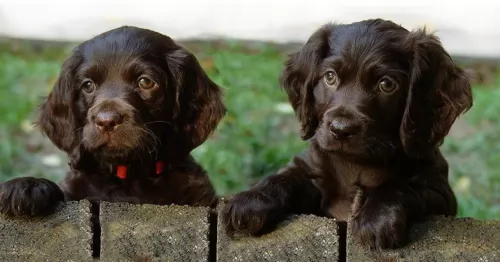 The Boykin Spaniel is a healthy breed with a life span of 14 to 16 years. There are some diseases that you want to be aware of with your Boykin Spaniel.
The Boykin Spaniel is a healthy breed with a life span of 14 to 16 years. There are some diseases that you want to be aware of with your Boykin Spaniel.
Always be aware of Hip Dysplasia as it can reduce your pet’s quality of life.. In dogs with hip dysplasia, the hip joint doesn’t to develop properly and deterioration sets in and your pet can lose function of the joint. You’ll notice your pet battling to stand up after lying down. The frightening this is that some dogs begin to show signs of hip dysplasia as early as 4 months of age.
The Boykin Spaniel’s most common health problems apart from hip dysplasia are patellar luxation and juvenile cataracts.
 As with any large purebred dog, the Bernese Mountain Dog needs high quality food that will provide hi with nutrition and keep him from becoming overweight if fed properly. He is however a very large dog with a very large appetite. Watch his calorie intake. It’s ok to use treats if you fit them into the overall calorie intake for the day. Feed him smaller meals twice a day.
As with any large purebred dog, the Bernese Mountain Dog needs high quality food that will provide hi with nutrition and keep him from becoming overweight if fed properly. He is however a very large dog with a very large appetite. Watch his calorie intake. It’s ok to use treats if you fit them into the overall calorie intake for the day. Feed him smaller meals twice a day.
As previously mentioned the breed has quite a few health challenges to deal with, cancer being the number one issue. The small genetic line is one of, if not the main, culprit in this high mortality rate and short life span of the Bernese Mountain Dog. In addition to the conditions mentioned above, they are also susceptible to bloat (stomach inversion). In addition, they face the conditions mentioned previously and should be tested for dysplasia of the hip and elbow, Von Willebrand’s Disease, Cardiac testing and an eye or ophthalmologist exam.
The Bernese Mountain Dog is a gentle giant. They have a calm happy demeanor and they love to work. In fact, they need to work. They love children and will quickly give them cart rides. They compete in carting competitions and herding events sponsored by the AKC. They need exercise but not an extreme amount or intense type. A half-hour a day is enough for them. They love long walks or hiking. They are great companions for backpacking or camping. They are also good at tracking, rally, obedience, and agility.
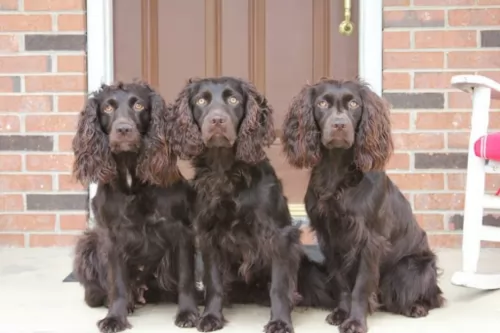 The Boykin Spaniel has been a gun dog and because he is energetic, he will need plenty of exercise and activities. Take him for walks or allow him to swim in the farm dam if you live in the country. He isn’t a dog to leave on his own in your backyard as he needs exercise as well as mental stimulation to keep him from becoming frustrated and developing destructive habits.
The Boykin Spaniel has been a gun dog and because he is energetic, he will need plenty of exercise and activities. Take him for walks or allow him to swim in the farm dam if you live in the country. He isn’t a dog to leave on his own in your backyard as he needs exercise as well as mental stimulation to keep him from becoming frustrated and developing destructive habits.
The Boykin’s hair will need to be brushed as least twice a week to prevent it from matting, particularly if he is a country-living dog, in and out of water and running through long grass. He is not a heavy shedder but his shedding is seasonal. As a long eared dog, he will need to have his ears checked to prevent infection.
Other grooming habits to get used to with your Boykin Spaniel are having his nails trimmed and brushing his teeth at least 2 or 3 times a week with special dog toothpaste and brush.
Boykin Spaniel owners who know the breed well say that there is nothing better than feeding your dog raw meat with vegetables and rice. Of course, not everyone can afford to feed their pets raw meat every day, and that’s alright. Just make sure that every now and then you include raw meat into your pet’s diet.
The very best commercially produced dog foods can also be good for your pet. If in doubt, speak to your veterinarian about the best food for your active, energetic pet. Never, ever deprive your pet of fresh, cool water throughout the day and night.